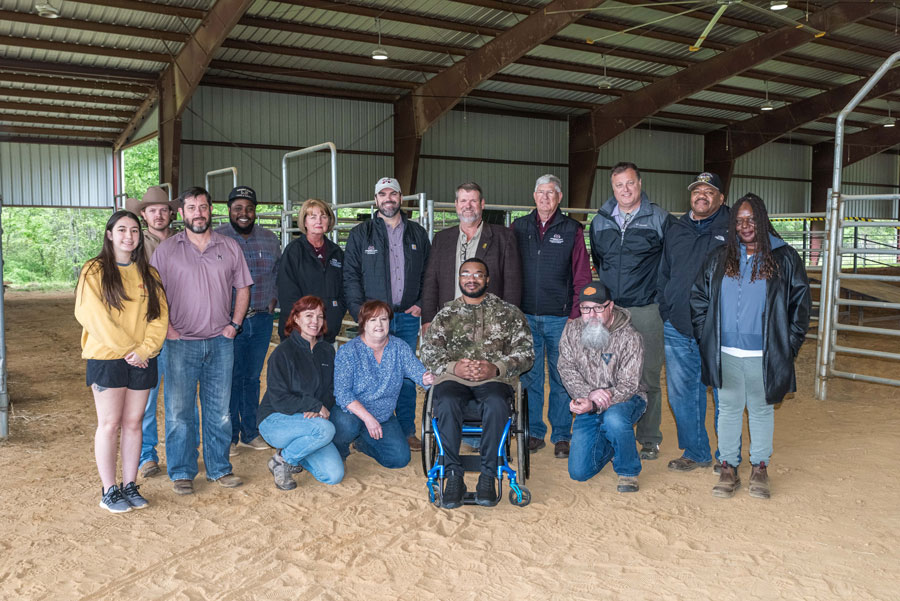What’s New in Extension
Leaders at Choctaw Preview Day included, from left, Ra’Sheda Forbes, Mississippi State University vice president for access, opportunity and success; Tia Grisham, Misissippi Band of Choctaw Indians representative of the Youth Opportunity Program; and Mariah Morgan, interim department head of the MSU Extension Center for 4-H Youth Development.
Collaboration Makes Choctaw Preview Day a Success
By Nathan Gregory • Photo by Kevin Hudson
More than 80 grade-school students from Choctaw Tribal Schools visited Mississippi State University in March to participate in Choctaw Preview Day.
The experience, co-hosted by the MSU Extension Service Center for 4-H Youth Development and the MSU Office of Inclusive Excellence, gave students a chance to tour the campus and learn about MSU’s many different degree programs.
The students completed the 4-H Build Your Future career-readiness curriculum before Choctaw Preview Day. A partnership between the Mississippi Band of Choctaw Indians and MSU, the event was funded by a New Beginning for Tribal Students grant from the U.S. Department of Agriculture and a match by MSU and Extension.
On the grant, MSU Extension partners with the MBCI Youth Opportunity Program; MBCI; MSU Division of Access, Opportunity, and Success; Holmes Cultural Diversity Center; Indigenous Students and Allies Association; and the MSU Departments of Anthropology, Sociology, and Agricultural Economics.
MSU, Noxubee Refuge hosted special needs adults
By Bonnie Coblentz • Photo by Kevin Hudson
An underserved community spent a day enjoying the outdoors at the Sam D. Hamilton Noxubee National Wildlife Refuge in early May when Mississippi State University Extension Service personnel hosted 20 adult residents of care homes in Noxubee, Oktibbeha, Choctaw, and Winston Counties.
Participants came to the refuge to learn about nature and spend a day outdoors.
The group started the day indoors with a video about the history of the Noxubee National Wildlife Refuge; then, they went outdoors for sensory activities. They used binoculars to look at birds and alligators on Bluff Lake. They handled pelts of a variety of fur-bearing animals, including squirrel, skunk, deer, beaver, and coyote.
At other stations, they smelled flowers, tasted muscadine juice and jam, and looked at leaves, snake eggs, and exotic insects. Participants also heard a demonstrator make turkey calls with a variety of items found in nature.
Extension coordinated the event with help from several agents and U.S. Fish and Wildlife Service staff.

Cookout Assists Veterans’ Horsemanship Program
By Nathan Gregory • Photo by Kevin Hudson
The Mississippi State University Extension Service hosted an April cookout benefiting members of the Veterans’ Horsemanship Program, one of several divisions in its Equine-Assisted Services. The free program assists people who served in defense of the nation.
Participants, including veterans, horse lovers, and the general public, gathered at the Elizabeth A. Howard Therapeutic Riding and Activity Center in West Point. The event, cosponsored by the MSU Center for America’s Veterans, aimed to build more connections between the university and the state’s veteran community by showcasing the horsemanship program.
In addition to the Veterans’ Horsemanship Program, Extension’s Equine-Assisted Services program includes therapeutic riding and hippotherapy.
MSU Master Irrigator Program Equips Growers
By Bonnie Coblentz • Photo by Kevin Hudson
The Mississippi State University Extension Service is offering Master Irrigator status to those who complete a course of training, including 8 hours of online classes and 16 hours of in-person training.
There is no cost to growers to participate, and the goal is for participants to apply the skills acquired at their production operations.
Mississippi joins Texas, Oklahoma, and Colorado as states that have launched formal irrigation training programs. Several others are in the process of creating their own state programs. However, Mississippi’s program is unlike the others because it is a hybrid that combines online classes with in-person training.
The Master Irrigator class will be offered each year. It starts in October when the online modules are open, and participants have until January 31 to complete them. The in-person session is held in February. In 2024, 38 people completed the inaugural class.


